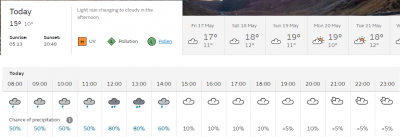I think the next generation of forecasts will probably be AI driven
House-2 bed partial stone bungalow, 5kW Samsung Gen 6 ASHP (Self install)
6.9 kWp of PV
5kWh DC coupled battery
Blog: https://thegreeningofrosecottage.weebly.com/
Heatpump Stats: http://heatpumpmonitor.org/system/view?id=60
Posted by: @bontwoodyI think the next generation of forecasts will probably be AI driven
…so it can predict bad weather, criticise the Met Office and swear at you all in the same sentence. 😉
105 m2 bungalow in South East England
Mitsubishi Ecodan 8.5 kW air source heat pump
18 x 360W solar panels
1 x 6 kW GroWatt battery and SPH5000 inverter
1 x Myenergi Zappi
1 x VW ID3
Raised beds for home-grown veg and chickens for eggs
"Semper in excretia; sumus solum profundum variat"
@majordennisbloodnok …and in an American accent. 😉 Toodles
Toodles, heats his home with cold draughts and cooks food with magnets.
Posted by: @jancoldThere are so many apps that forecast marine weather but they rarely agree with each other. Anyway I am going way off topic.
I think it is on topic enough, in that weather is the main determinant of our heating demand, and an ability to predict future weather could, if it can be done, be very useful in managing a heating system.
The fact that many apps produce different forecasts despite starting with the same data (past observations) is telling. It tells us that when it comes to weather forecasting, the science of modelling is far from perfect. Meteorologists will probably say 'ah, that's what happens with complex systems, you know, the butterfly's wing in Brazil and all that' but really that is just an excuse to explain why their models fail. Weather is a very complicated thing, and its prediction is uncertain. The modern trend of forecasting probabilities (10% chance of precipitation at 1200 today in this location) adds a spurious air of pseudo-confidence, but in the event, there is no such thing as 10% precipitation, just as there is no such thing as 2.2 children. At any one time in any one place there either is or isn't precipitation, just as parents have say two or three children, never 2.2 children. This failure of the aggregate to predict the individual outcome is inherent in modelling. It predicts (but in no way assures) the average outcome, not the individual outcome, and unfortunately, it doesn't even get the average right very often.
In passing, predicting tidal streams in a complex area like the Solent is a similar challenge. I have no less than four (maybe more!) tidal stream atlases for the Solent, and they all differ to a greater or lesser degree. The more traditional ones based on just observed data are generally better, especially when 'local knowledge' is added, the worst by far is an atlas that uses a computed modelled gridded system ('data scientists' love grids, it makes them feel in control, like a drill sergeant gridding his raw recruits; the AFVS paper I mentioned also uses a gridded modelling system to make up the 'truth data' for missing cells).
The general point is beware modellers bearing gifts of rich data, because they are often wrong.
Posted by: @majordennisbloodnokI know this is probably a silly question but isn’t a forecast based on observed data to start with? i.e. data from the various weather monitoring stations? If so, why can they not use those same observations to compare against the forecast from x number of days ago?
That said, I seem to remember reading that percieved accuracy is based on the predicted weather for now vs the actual weather for now whilst in fact the prediction could be remarkably astute but an hour or two out (and therefore still an accurate forecast within reasonable time variations) and therefore appearing bad. I hasten to add that I am in no way an expert so am happy to be disabused of this viewpoint by anyone prepared to debunk it convincingly.
I rather suspect they don't want to look too closely, at least in public, at the observed weather vs the expected weather (yes, that is observed vs expected again...) because they know it is a recipe for red faces in high places. But in principle it is very doable, and is what I am trying to do. The problem is how to automate the process. I can already manually compare yesterday's forecast weather with yesterday's actual weather for a given time and location, but to build up a more astute (sic) picture, I need to do that for a lot of time/place combinations, and that is why I need to work out how to automate the process, and the problem there is converting what is in effect free text (the forecast) into something a computer can store and analyse. It's a coding problem, how to code the free text into something systematic that a computer can use.
Timing is indeed a major headache for weather forecasters. They may have a good idea of the expected weather pattern, eg a low moving across the UK will tend to cause SE veering SW veering NW winds in the Channel, but what they are far less sure of is when that pattern will happen, because it depends very much on the track and speed of the low as it crosses the UK, and that is much harder to predict. They end up playing a variation of Eric Morecombe's tune, all the right notes, but not necessarily in the right order.
Posted by: @editorI looked into weather models last year because I found it annoying how, for example, the BBC weather website would have one forecast, and the BBC weather report on TV would have another and it turns they all use different modelling data (not sure why they do that).
There is a rumour the BBC stopped using the Met Office to provide its forecasts, and swapped to some budget option a few years ago, and as with budget airlines, you all too often end up in the wrong place at the wrong time. Also worth noting the variations arise not so much because they are using different modelling data (obs are obs), as different modelling models. The choice of model, and what the modeller chose to include and exclude, lies behind the variations. Websites like windy provide an easy way to switch models by clicking on the list of models at the bottom of the page.
Posted by: @toodlesSome of the most powerful supercomputers have been built and installed for meteorological prediction systems.
I think I am right in saying the Met Office's super computer is the mother of all super computers. The problem is complex systems, too many variables, and errors that compound over time. Beyond a very short time frame, perhaps 12 to 24 hours, the whole thing is probably an absurd hubristic endeavour. The modelling paradigm - use past data to build a model, add some gridding to fill in the gaps, and then do some whatiffery to get a forecast - is simply not up to the job, and I doubt it ever will be. It's a bit like using a steam engine to get to the moon, a technology doomed to fail in that endeavour, and no amount of better faster more powerful steam engines will ever succeed. We humans have yet to invent a new and revolutionary way of making better weather (and many other) predictions. There will certainly be a Nobel prize for anyone who comes up with something that works.
Posted by: @bontwoodyI think the next generation of forecasts will probably be AI driven
God help us! Surely I don't need to point out that AI is just modelling by another name, and the whole point is the models don't work much of the time. The powers that be are just doing a 'the paradigm is dead, long live the paradigm' dance. It is also if you look carefully a bit of an own goal, if 'Artificial intelligence (AI) has the potential to revolutionise weather forecasting', then the implication is surely that current forecasts must be pretty dire.
Endnote: reading and replying to the thread post by post, I see that I have covered points already made by others - sorry!
Midea 14kW (for now...) ASHP heating both building and DHW
@cathoderay The Nobel Prize will never happen as just as the final stage is being tested …. Funding will be Cut!
As to what and how Tesla are using for their weather predictions to decide on how much charge should be put in my battery - they have it all wrong! Charged overnight at cheapest times (five hours available), I wake up to find just 68% charge and it is grey now, wet and predicted to remain so all day! Harrumph! Toodles.
Toodles, heats his home with cold draughts and cooks food with magnets.
Anyway, so far we have all missed the main protagonist … Bank Holidays! 😉 Toodles.
Toodles, heats his home with cold draughts and cooks food with magnets.
Back to forecasts: I have a particular interest at the moment in whether it is going to rain or not (location is central south coast). Yesterday morning I am pretty sure the forecast (Met Office) was dry weather for the next few days, and I made my (foolish) plans accordingly. This morning we have rain forecast for all morning, some of it heavy:
For interest's sake, I had a look at google's cached version, which is timed at 22:01:06 GMT yesterday evening, ie less than 12 hours ago. The forecast then was rather different, only light showers between 1000 and 1300:
Who knows what will actually happen! No rain, light rain, or heavy rain? Also note how the 'probabilities' have changed. This volatility in the forecast is the product of modelling by one of the world's biggest supercomputers. Another way of describing it may be to say it is the world's most expensive random number generator.
Midea 14kW (for now...) ASHP heating both building and DHW
@cathoderay 🤣 🤣 Toodles
Toodles, heats his home with cold draughts and cooks food with magnets.
Posted by: @cathoderay
Back to forecasts: I have a particular interest at the moment in whether it is going to rain or not (location is central south coast). Yesterday morning I am pretty sure the forecast (Met Office) was dry weather for the next few days, and I made my (foolish) plans accordingly. This morning we have rain forecast for all morning, some of it heavy:
-- Attachment is not available --
For interest's sake, I had a look at google's cached version, which is timed at 22:01:06 GMT yesterday evening, ie less than 12 hours ago. The forecast then was rather different, only light showers between 1000 and 1300:
-- Attachment is not available --
Who knows what will actually happen! No rain, light rain, or heavy rain? Also note how the 'probabilities' have changed. This volatility in the forecast is the product of modelling by one of the world's biggest supercomputers. Another way of describing it may be to say it is the world's most expensive random number generator.
Hmm.
Looking at the images you posted, I'm interpreting it differently. Your first one (closer to the event) forecasts a 50% probability of rain between 8am and 2pm (jumping up to 80% chance during the middle). The second one (the earlier forecast from twelve hours earlier) forecasts a 40% probability between 10am and 1pm. So they're both forecasting a reasonable chance of rain and the closer to the event it gets the clearer it becomes what's likely to happen. I don't see any inconsistency in that. Indeed, I'd be worried if the Met Office didn't update their forecast based on new data coming in.
105 m2 bungalow in South East England
Mitsubishi Ecodan 8.5 kW air source heat pump
18 x 360W solar panels
1 x 6 kW GroWatt battery and SPH5000 inverter
1 x Myenergi Zappi
1 x VW ID3
Raised beds for home-grown veg and chickens for eggs
"Semper in excretia; sumus solum profundum variat"
Posted by: @majordennisbloodnokIndeed, I'd be worried if the Met Office didn't update their forecast based on new data coming in.
Of course, but that is not the point I am getting at here, which is the volatility over short time frames, in this case 24 hours or less. The bottom line is that forecasts that change cannot all be correct, in reality only one (if that) gets it right, which means all the others were wrong. You might imagine with all the hype that modern forecasting can do rather better than this. There's also the collapse of the probability function thing I have mentioned before (in effect, applying group probabilities to an individual becomes meaningless in the event): a 60% probability of rain does suggest rain is more likely that a 30% probability, but in the event, it either rains or it doesn't, and you have no way of knowing in advance, given say a 50% probability, whether you will be in the 50% that gets rain or the 50% that doesn't. You might as well toss a coin...
It's also not just about probabilities, but also the type of precipitation forecast, which in this example ranges from none through light showers and light rain to heavy rain. No rain is good, light showers can sometimes be worked around, but heavy rain is a wash out.
Another way of looking at such forecasts is that they are a Schroedinger's cat problem: you don't actually know whether it is going to rain or not until you observe it, by which time you already know whether it is raining or not!
Midea 14kW (for now...) ASHP heating both building and DHW
@cathoderay If you can see them hills, it is going to rain - if you can’t see them hills, it is raining. 😉
Toodles, heats his home with cold draughts and cooks food with magnets.
- 27 Forums
- 2,495 Topics
- 57.8 K Posts
- 638 Online
- 6,220 Members
Join Us!
Worth Watching
Latest Posts
-

RE: Humidity, or lack thereof... is my heat pump making rooms drier?
That’s my pleasure, @andrewj. The only challenge now is...
By Majordennisbloodnok , 2 hours ago
-
RE: Electricity price predictions
@toodles @skd Then there is not going to be much from t...
By ChandyKris , 2 hours ago
-
RE: Solis inverters S6-EH1P: pros and cons and battery options
@batpred I reckon Andy might know a thing or 2 about...
By Bash , 3 hours ago
-
RE: What determines the SOC of a battery?
@batpred Ironically you didn't have anything good to...
By Bash , 4 hours ago
-
RE: Testing new controls/monitoring for Midea Clone ASHP
Here’s a current graph showing a bit more info. The set...
By benson , 4 hours ago
-
RE: Setback savings - fact or fiction?
True there is a variation but importantly it's understa...
By RobS , 4 hours ago
-

Below is a better quality image. Does that contain all ...
By trebor12345 , 4 hours ago
-
Sorry to bounce your thread. To put to bed some concern...
By L8Again , 4 hours ago
-

@painter26 — they (the analogue gauges) are subtly diff...
By cathodeRay , 5 hours ago
-
Our Experience installing a heat pump into a Grade 2 Listed stone house
First want to thank everybody who has contributed to th...
By Travellingwave , 9 hours ago
-
RE: Struggling to get CoP above 3 with 6 kw Ecodan ASHP
Welcome to the forums.I assume that you're getting the ...
By Sheriff Fatman , 12 hours ago
-
RE: Say hello and introduce yourself
@editor @kev1964-irl This discussion might be best had ...
By GC61 , 13 hours ago
-

RE: Oversized 10.5kW Grant Aerona Heat Pump on Microbore Pipes and Undersized Rads
@uknick TBH if I were taking the floor up ...
By JamesPa , 1 day ago
-

RE: Getting ready for export with a BESS
I would have not got it if it was that tight
By Batpred , 1 day ago
-
RE: Need help maximising COP of 3.5kW Valiant Aerotherm heat pump
@judith thanks Judith. Confirmation appreciated. The ...
By DavidB , 1 day ago
-

RE: Recommended home battery inverters + regulatory matters - help requested
That makes sense. I thought better to comment in this t...
By Batpred , 1 day ago
-
Bosch CS5800i 7kW replacing Greenstar Junior 28i
My heat pump journey began a couple of years ago when I...
By Slartibartfast , 1 day ago
-

RE: How to control DHW with Honeywell EvoHome on Trianco ActiveAir 5 kW ASHP
The last photo is defrost for sure (or cooling, but pre...
By JamesPa , 1 day ago
-

RE: Plug and play solar. Thoughts?
Essentially, this just needed legislation. In Germany t...
By Batpred , 1 day ago
-
RE: A Smarter Smart Controller from Homely?
@toodles Intentional opening of any warranty “can of wo...
By Papahuhu , 2 days ago
-
RE: Safety update; RCBOs supplying inverters or storage batteries
Thanks @transparent Thankyou for your advic...
By Bash , 2 days ago
-
RE: Air source heat pump roll call – what heat pump brand and model do you have?
Forum Handle: Odd_LionManufacturer: SamsungModel: Samsu...
By Odd_Lion , 2 days ago
-
RE: Configuring third party dongle for Ecodan local control
Well, it was mentioned before in the early pos...
By F1p , 2 days ago





